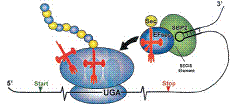Biochemistry, Department of

Vadim Gladyshev Publications
Document Type
Article
Date of this Version
March 2005
Abstract
Selenium is an essential micronutrient in the diet of mammals and has many health benefits. Selenium-containing proteins are responsible for most, if not all, of these benefits. This element is incorporated into protein as selenocysteine (Sec), the 21st amino acid in the genetic code. There are two species of Sec tRNA in mammalian cells that differ by a single 2’-O-hydroxymethyl group on the ribosyl moiety at position 34 (Um34). The relationship between this modification and selenoprotein synthesis was examined in mice in which the wild type Sec tRNA gene was replaced with a mutant Sec tRNA transgene incapable of forming Um34. This mouse line did not express several stress-related selenoproteins, whereas the levels of several selenoproteins thought to serve housekeeping functions were normal. This novel form of protein regulation occurred at the translational level. The Um34 modification in Sec tRNA, therefore, plays a crucial role in regulating the expression of a subset of mammalian selenoproteins and is a requisite for the synthesis of several stress-related selenoproteins.


Comments
Published in Topics in Current Genetics, Vol. 12.